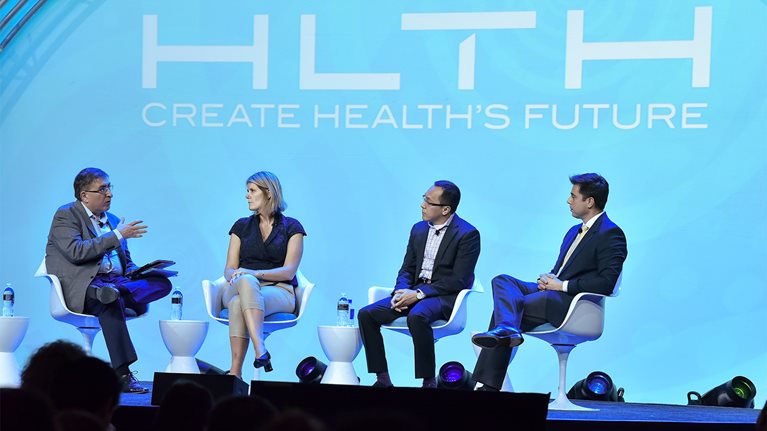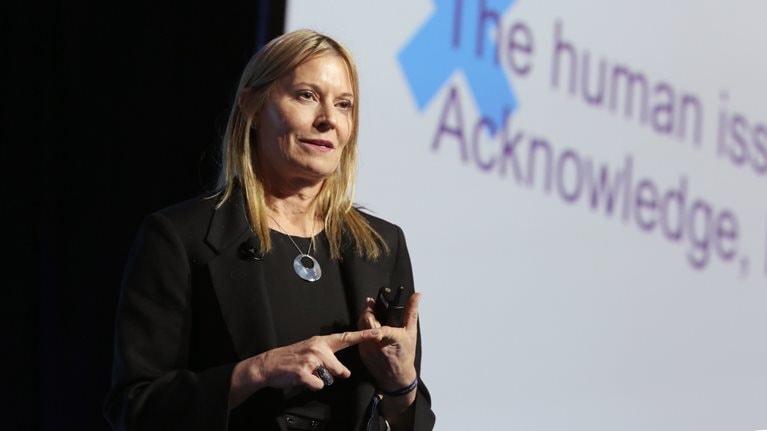Investment in healthcare technology is growing at a feverish rate: $4.2 billion was invested in digital health in the first half of 2019, and consumers can now choose from no fewer than 300,000 mobile healthcare applications.
How can an organization navigate such a complex, volatile landscape? Which technologies—electroceuticals, genomics, and AI, to name a few—will move the needle on improving care? How, when, and where to start?
These questions and others dominated the second HLTH conference in Las Vegas last month, where our firm served as a knowledge partner. In just two years HLTH attendance has surged to around 6,000 people, attesting to the urgency of these challenges. And while the conference was held in a city known as a place for taking chances, the discussions there were all about reducing risk—of investing in new models, capabilities, and ecosystems.
Speakers this year included leaders such as the late Bernard J. Tyson, former chairman and CEO of Kaiser Foundation Health Plan; Larry Merlo, president and CEO of CVS Health; and Anne Wojcicki, cofounder and CEO of 23andMe. In addition, more than 20 colleagues from our Healthcare Systems & Services Practice attended the event. Here’s a snapshot of what they saw and heard.
From ‘patient’ to ‘digital consumer’
McKinsey partner Jack Topdjian sat down with Facebook’s Freddy Abnousi, MD; Twitter’s Lisa Bookwalter; and Tencent’s Meng Zhang for a panel discussion on the role of social-media platforms in healthcare.

With new applications, increased information, and the ability to make social, clinical, and behavioral connections, social media is consumerizing the health experience. It’s also helping users and their doctors better manage social determinants: factors such as diet and support systems that can influence up to 40 percent of a patient’s health outcome.
But panelists also discussed the rise of misinformation on their platforms. For example, the Chinese tech giant Tencent has around 100,000 new health-related articles circulating each day. Winning users’ trust by helping them evaluate and navigate that landscape represents an enormous opportunity.
Swimming with the ‘sharks’
The HLTH agenda this year also included a dose of reality TV: specifically, Shark Tank. Fifteen applicants competed in a session called the Start-Up Pitch for prizes including a workshop with McKinsey featuring experts from Fuel, a McKinsey company dedicated to serving global start-ups and their investors.
The contestants had three minutes to pitch their products and three minutes to field sharp questions from a panel of judges from venture-capital companies. Ideas included an application using genomics data to determine diets, a 30-second breath test that monitored more than ten health markers, and an AI algorithm that could identify the most viable embryos for in vitro fertilization.
While all of the ideas were ambitious and far reaching, the inspiration for many came from close to home: a mom with chronic heart condition, a younger brother with autism, and an infant son who was hospitalized.
The winners? The audience chose Particle Health, a “Venmo-like transfer service for medical records.” The judges’ favorite was Manatee, a mobile app that allows children with autism and developmental disabilities to receive cognitive-behavioral therapy at home.

The focus of the session then moved behind the scenes for a look at how start-ups actually function, with new research presented by Judy Wade, a leader at Fuel.
“Start-ups tend to be tightly cohesive and physically located together. They align quickly, take risks, and often have a charismatic leader,” explained Judy. “But they also can have biases that influence decisions, such as ‘anchoring bias,’ which means relying too heavily on the first piece of information and ‘confirmation bias,’ the belief that past success guarantees future success.”
“Trying to dull the edges of the culture isn’t the right answer—it’s why a start-up can be successful,” Julie added. “But they need to find a way through training and forums to recognize their biases so they can pause and make better decisions about who to hire, how to invest, and [how to] manage the day to day. The result will be a more diverse, balanced, and, ultimately, successful organization.”
Reinventing Medicaid
Healthcare programs serving low-income, vulnerable populations, such as Medicaid, are perhaps among those most in need of innovation today. Ellen Feehan, Jessica Kahn, Katherine Linzer, and Meera Mani, all partners at McKinsey, organized a workshop featuring leaders of state Medicaid programs, who shared their experiences in implementing digital tools, advanced analytics, AI, and agile methodologies to better serve their populations.
The leaders from Michigan made one of the session’s biggest impressions. With a flourish, the speakers unfurled a 30-foot-long sheet of paper, which rolled out to the back of the room. It was a printout of the state’s previous Medicaid application form: 42 pages, 18,000 words, and a 50 percent denial rate.
Step by step, the speakers from Michigan took the audience through their years-long effort to reinvent the application process in their state into a mobile-first, online experience that was 67 percent faster, with 75 percent fewer errors. “I’m so jealous,” called out one of the audience members.
Four other success stories followed, each featuring a different tech approach, all designed hand in hand with their clients to create the changes people want.
Evolving to ecosystems
The next horizon of healthcare will be the maturing of ecosystems—networks of collaborators working across payers, providers, pharma, med tech, digital start-ups, big tech, and government. They will help deliver an exceptional patient experience, democratize access to physical and virtual care, and deliver new models and technologies.
But how does an organization find—or build—an ecosystem that fits its goals?
Jack Topdjian, along with Brandon Carrus, Erica Coe, Pooja Kumar, Prashanth Reddy, and Sri Velamoor, all partners at McKinsey, organized a series of workshops in which leaders were challenged to radically reimagine the journeys of a variety of patients, from a 22-year-old man with type 1 diabetes to an elderly woman with two or more chronic conditions.
Now it’s time to lead our [industry]—to the benefit of our society’s most vulnerable members.
Jack TopdjianMcKinsey partner
They designed an ecosystem that encompassed all of the components of health and advanced technologies, including nutrition, mental health, and support networks, to help them manage their conditions and enhance their wellness. Other topics included improving productivity and eliminating waste.
“The overall mood was pensive, as many have work to do,” said Jack. “But the silver lining is that other industries have done this type of evolution. Now it’s time to lead ours—to the benefit of our society’s most vulnerable members.”